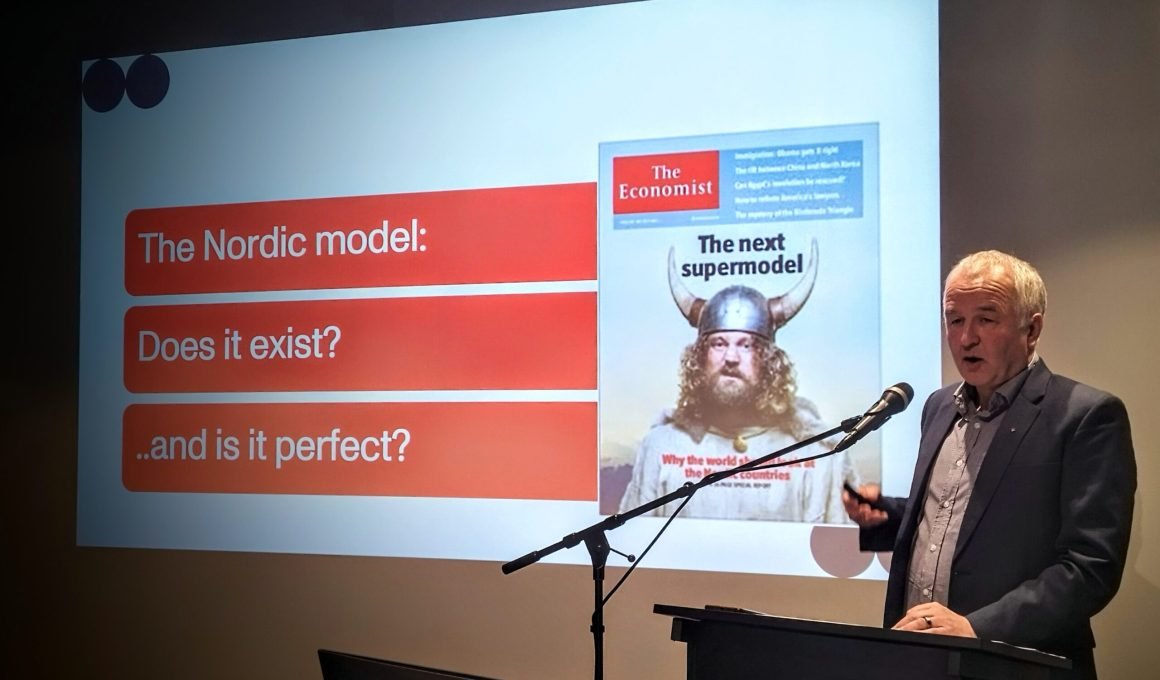On September 30, in Vilnius, at the “Neringa” conference center, the international conference “Possibilities through social dialogue and collective agreements” was held.
Dalia Jakutavičė, president of the Lithuanian Industry Trade Union Federation (LPPSF), gave a welcome speech to the participants of the event. She summarized the results of the project “Improving Social Dialogue in Industry sector in Lithuania”. This project was carried out together with partners from the Norwegian trade union “Fellesforbundet” and was financed by the “Norway grants”. The conference was the final event of the project, during which the participants from different social partners’ organizations were aiming to find common points of agreement in determining the guidelines of the social dialogue in Lithuania.
Experts form the Norwegian trade union “Fellesforbundet” Jørgen Kaurin and Catherine Ulvøy presented the Norwegian social dialogue model of social dialogue.
According to Mr. Kaurin, one of the main elements that distinguishes this country’s model from others is a strong representation in collective bargaining through numerous organizations, which is characteristic for both parties – employers and employees. Another important feature is the fairness of salaries: the difference between the salaries of managers and specialists is small or almost imperceptible. This contributes to the reduction of tension between workers and managers and helps ensure a sense of social justice.
J. Kaurin noted that collective negotiations in Norway resemble a salsa dance at times, when everything goes smoothly and both sides agree, and sometimes it’s like a boxing ring, when you have to fight hard for your position. However, most of the time, even after the fiercest disputes, it finishes with a dance – agreement.
Jelena Polijančuk, senior adviser of the labour law group of the Ministry of Social Security and Labor of the Republic of Lithuania, spoke about the benefits of social partnership and collective agreements. She pointed out that it is important for Lithuania to strengthen higher-level collective bargaining, especially in the private sector (currently, according to statistics of the Ministry, only 34% of all collective agreements in the country are concluded in the private sector).
Project experts Prof. Dr. Vida Petrylaite and Dr. Marius Kalanta introduced the participants with the analysis of collective agreements in the industrial sector which was made in frames of the project.
V. Petrylaitė, while presenting the legal aspects of collective agreements, pointed out that many provisions of collective agreements still repeat the articles of the Labour Code, when the Code itself, in certain cases, allows for deviations from the norms and for both parties to agree taking into account the specifics of the company or sector activities, if the agreement achieves a balance between the interests of the employer and the employees.
Meanwhile, M. Kalanta spoke about the economic leverage of the agreements. He regretted that a large number of Lithuanian employers do not see the advantages of collective agreements and the fact that they can be one of the driving factors of the economy, especially in crisis. According to the expert, if only employers realized that agreements with employees stimulates a win-win situation, today we would have a different – probably a better- labour relations and economic situation.
At the end of the event a discussion was held with Jelena Polijančuk, member of the Seimas Tomas Tomilinas, experts Vida Petrylaite and Marius Kalanta, president of the Lithuanian Confederation of Industrialists Ričardas Sartatavičius, chief expert Eigilė Čygaitė-Elzbergienė, lawyer of the Lithuanian District Heating Associations Egidijus Šimoliūnas, president of the Lithuanian Trade Union Confederation Inga Ruginienė and president of the LPPSF Dalia Yakutavičė.
The discussion sought answers on how to find a balance between coercive mechanisms and a legal environment that encourages negotiations between parties, thus stipulating a higher motivation of the employers.
During the discussion, the extremely disturbing situation of the heat sector was also discussed. It was noted that although work in heat companies is difficult and even dangerous, requiring special knowledge, high qualifications, and special training, this is not at all reflected in the salaries of the employees.
Due to the specifics of the methodology for determining the price of heat by the state price regulator (VERT), the employee wage component is insufficient and inadequate compared to the Lithuanian market. Statistical data show that specialists of some companies earn only slightly more than the minimum monthly salary in Lithuania. Unfortunately, there is also a misconception in the society that heating workers receive high salaries.
Therefore, many young specialists do not stay longer in heat supply companies and choose similar work in the private sector or in other sectors or emigrate to other countries.
This presupposes a large turnover of employees and aging trends of employees in the heat sector, and educational institutions do not attract new students to heat engineering specialties. So there is a real risk to the survival of the sector.
An animated video which was created during the project was featured in the conference. What happens when employees and employers start looking for solutions together, and vice versa – how does the reluctance to negotiate affect the company’s activities?
The animation can be viewed by following this direct link:
https://www.youtube.com/watch?v=fHv-B14LCJg&ab_channel=LPPSF
Broadcast recording of the conference here:
https://www.facebook.com/pramprof/videos/1099512210677897
Photo gallery of the event here:
https://www.facebook.com/media/set?vanity=pramprof&set=a.532682152191452







